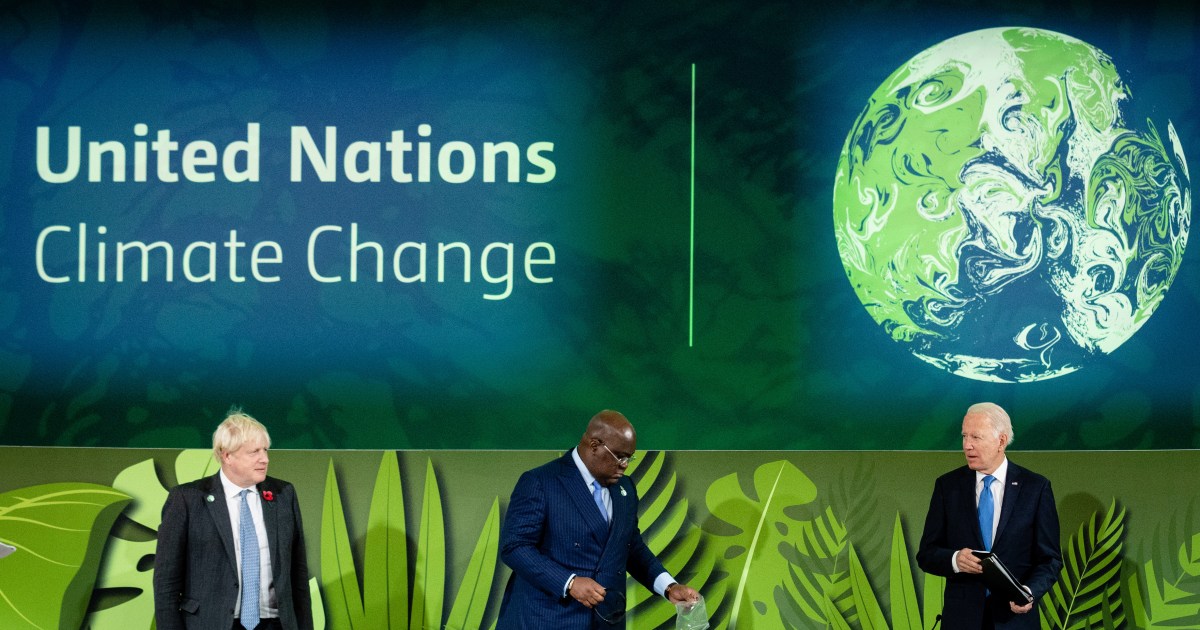Today, Tuesday, at the COP26 climate conference in Glasgow, world leaders reached two key agreements aimed at containing greenhouse gases that cause global warming and protecting forests.
World leaders are under pressure to do more to combat climate change and limit warming to 1.5 degrees Celsius at the two-week climate conference in Glasgow, Scotland.
More than 80 countries, including the European Union and the United States, pledged Tuesday at the conference to reduce emissions of methane, one of the main greenhouse gases that cause global warming, by 30% by 2030, European Commission President Ursula von der Leyen announced.
Methane is the main greenhouse gas after carbon dioxide, and one of its characteristics is that it has a greater capacity for greenhouse gases than carbon dioxide, but it decomposes in the atmosphere at a faster rate, which means that reducing its emissions can have a rapid impact in limiting the rise in temperature. planet heat.
“Methane is one of the gases that we can reduce faster,” Ursula von der Leyen said alongside US President Joe Biden, noting that it is responsible for “about 30%” of global warming since the Industrial Revolution.
For his part, Biden said, "It is one of the most powerful greenhouse gases," stressing that the signatories of this commitment represent 70% of global GDP.
The United States and the European Union announced in mid-September to work together on a draft of this agreement, which has since been joined by dozens of other countries, including Canada, South Korea, Vietnam, Colombia and Argentina.
forest protection
With the aim of halting the deterioration of forests - which along with the oceans play a key role in combating climate change - and restoring them, the leaders of more than 100 countries, which comprise 85% of the world's forests, including the Boreal Forest of Canada, the Amazon forest in Brazil and the Congo Basin tropical forest, approved the joint declaration during the second day of the Conference.
The initiative will benefit from official and private funding of $19.2 billion over the years.
According to the NGO Global Forest Watch, the pace of global deforestation has accelerated in recent years, with the destruction of native forests increasing by 12% in 2020 compared to 2019.
Among the signatories are China, Russia, France, Australia and the United States.
The new pledge to combat deforestation coincides with the "New York Declaration on Forests" in 2014, in which many countries committed to halving this phenomenon by 2020 and eliminating it by 2030.
But NGOs such as Greenpeace consider the 2030 target too far away and give the green light to "cut trees for an additional decade".
For its part, Global Witness expressed its fear of "a repeat of the failure of previous pledges" due to lack of funding and failure to fulfill promises.
international plan
More than 40 countries have backed a British-led global plan to ensure clean and affordable energy is accessible and affordable worldwide.
The British government expects the possibility of creating 20 million new jobs in the world, and investments in developing and advanced economies worth $ 16 trillion, as part of the international plan called the “Glasgow Breakthrough Agenda”.
The plan aims to ensure that clean energy technologies are made available to everyone and at low cost, all over the world by 2030.
Within the framework of the plan, the transformation of 5 sectors responsible for 50% of global emissions has been identified as a major goal.

